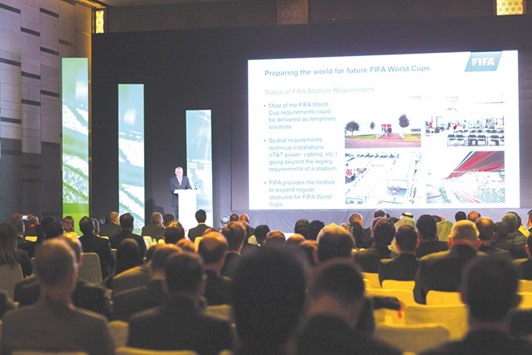The World Stadium Congress, in partnership with the Supreme Committee for Delivery & Legacy (SC), brought together over 300 of the globe’s most reputed stadium operators, architects and contractors, as well as federation directors, government officials, renowned athletes and tournament stakeholders.
Organised by IQPC, the first day of the conference on Day One boasted an unparalleled, diverse and prestigious speaker faculty representing four continents from a wide array of sport and stadia organisations.
Hosted by world famous sports broadcaster and journalist Richard Keys, the summit commenced with an honorary introductory address from Ooredoo Qatar, serving as an advocate for smart stadium technology for modern stadium and venue excellence in preparation for 2022 FIFA World Cup Qatar and beyond.
Following the welcome remarks, Jurgen Muller, head of Planning & Infrastructure and head of 2022 FIFA World Cup Qatar from FIFA, delivered the first keynote presentation, emphasising stadium requirements and specifications which venues must adhere to in order to qualify and deliver successful FIFA World Cups. Key themes included legacy, sustainability, financial feasibility and FIFA guidelines for football-focused stadiums.
Eng. Othman Zarzour, SC’s Competition Deputy Venues executive director, presented on competition venues in Qatar and laying the foundation for an effective World Cup preparation and execution.
He said: “I’d like to thank our partners and the organisers, for their hard work. This summit brings together local, regional and international experts on sports and stadia, encouraging discussions on innovative stadia design, construction and operation of major sporting venues and the legacy that will benefit the country’s communities in line with the Qatar National Vision 2030.”
The morning keynotes concluded with a joint presentation from Prof Dr Ashraf Sobhi, Deputy Minister, and Dr Tamer Abdel Azim, Technical Expert from the Ministry of Youth & Sports, Egypt. Through an ambitious slew of PPP (Public Private Partnership) projects, the Egyptian government is planning and delivering a diverse pipeline of national stadium projects, explored by Dr Sobhi’s and Dr Azim’s research.
The summit then proceeded with multiple break-out sessions, including a Dragon’s Den concept that allowed the world’s most relevant stadium solution providers, such as EMC, the chance to ‘pitch’ their systems to the likes of Tamim El-Abed, Project Manager – Lusail Stadium from the SC; Florian Alles, Chief Architect from gmp Architekten von Gerkan; Chris Dite, Associate Director, Sport Venue Design and Major Events from Arup, as well as others for live and interactive feedback.
The breakout presentations concluded with athlete speeches, meet and greets and autograph sessions with former Manchester United and France striker Louis Saha and Qatari star and Olympic high-jump athlete Mutaz Barshim. The day concluded with two Spanish stadium case studies from Bill Mannarell Director, Area Patrimonial, Espai Barca, on FC Barcelona’s landmark venue Camp Nou, and Javier Perez, Senior Member Architect from IDOM, on the international award-winning Bilbao Arena.
As Day One came to a close, the gathering effectively and comprehensively covered stadium technologies, security protocols, legacy programmes and more – looking at both regional and global case studies and demands.

Jurgen Muller, head of Planning & Infrastructure and head of 2022 FIFA World Cup Qatar from FIFA, delivers the first keynote presentation.
